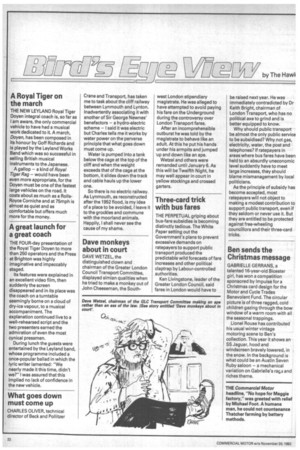Three-card trick with bus fares
Page 18

If you've noticed an error in this article please click here to report it so we can fix it.
THE PERPETUAL griping about bus-fare subsidies is becoming distinctly tedious. The White Paper setting out the Government's plans to prevent excessive demands on ratepayers to support public transport produced the predictable wild forecasts of fare increases and other political claptrap by Labour-controlled authorities.
Ken Livingstone, leader of the Greater London Council, said fares in London would have to be raised next year. He was immediately contradicted by Dr Keith Bright, chairman of London Transport, who has no political axe to grind and is better equipped to know.
Why should public transport be almost the only public service to be subsidised? Why not gas, electricity, water, the post and telephones? If ratepayers in areas where bus fares have been held to an absurdly uneconomic level suddently have to meet large increases, they should blame mismanagement by local politicians.
As the principle of subsidy has become accepted, most ratepayers will not object to making a modest contribution to support public transport, even if they seldom or never use it. But they are entitled to be protected against free-wheeling councillors and their three-card tricks.












































